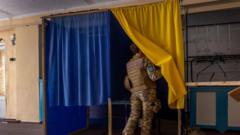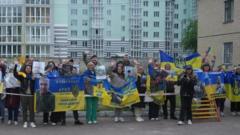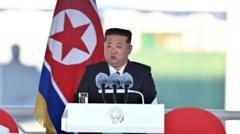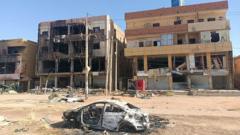In recent weeks, the potential for Ukraine to hold elections has surged back into discussion despite the backdrop of Russia's relentless military aggression. In Kyiv, where residents experience nightly air raids, the concept of elections might appear unrealistic, yet it is being debated amongst the populace and leadership. The idea of voting has been brought up numerous times throughout the past three years, only to be subdued by a collective emphasis on national unity against Russian forces. The 2024 presidential election was paused in accordance with martial law imposed following Russia's full-scale offensive two years ago.
Could Ukraine Hold Elections Amid War?

Could Ukraine Hold Elections Amid War?
As discussions unfold in Ukraine about the possibility of elections during an ongoing invasion, speculation swirls amid conflicting reports from government officials.
However, Russian officials—including those from President Vladimir Putin's administration—have labeled President Volodymyr Zelensky as illegitimate, presenting new elections as a prerequisite for any ceasefire discussions, a sentiment echoed by figures such as former President Donald Trump.
While some sources claim that discussions around elections are gaining momentum, key figures like Valerii Zaluzhnyi, who served as the command chief of Ukraine’s armed forces and is now the ambassador to the UK, have publicly refuted rumors regarding his potential candidacy, emphasizing the need to focus on winning the war rather than political ambitions.
The head of Ukraine's Central Election Commission, Oleh Didenko, indicated that significant legal changes would be necessary before elections could be sanctioned—declaring that current laws mandate parliamentary elections occur 60 days post-martial law lifting and presidential elections 90 days thereafter.
Interestingly, some reports suggest that President Zelensky might indeed be weighing the option of elections. That speculation intensified after claims surfaced indicating he convened a meeting to strategize on the electoral process, particularly in light of ongoing negotiations with Russia for a ceasefire. However, numerous government sources quickly dismissed the notion, labeling such reports as fabricated, indicating that peace remains the administration's primary focus.
Several factors contribute to the nagging belief that elections might still take place. President Zelensky’s approval ratings have seen an uptick, particularly following criticism from US political figures, suggesting he could capitalize on this moment for a renewed electoral mandate. Additionally, if he were to secure a second term, he could strengthen his position in negotiations with Russia, countering a narrative from Moscow suggesting his replacement is necessary for peace.
Timing may also play a role, as martial law is set for parliamentary renewal in early May, offering an opportunity for the government to announce elections prior to a full ceasefire. The Biden administration appears to be in favor of this idea, with officials indicating that elections could indeed happen, presenting possible pressure on Zelensky to follow suit.
Meanwhile, logistics pose a significant hurdle. Many Ukrainians remain displaced due to the war, which suggests digital voting mechanisms, like the Diia app—utilized previously by citizens for various governmental services—could provide a solution. Yet concerns regarding its security and technical viability, coupled with the potential for electoral chaos in a war-torn nation, weigh heavily against this argument. Additionally, public sentiment appears to be largely against holding elections during conflict, with recent polling indicating that 78% of Ukrainians oppose elections even post-war.
Thus, the debate regarding elections in Ukraine continues to oscillate between the desire for democratic processes and the harsh realities of ongoing warfare, underscoring the dilemma of maintaining unity while navigating the complexities of national governance.
While some sources claim that discussions around elections are gaining momentum, key figures like Valerii Zaluzhnyi, who served as the command chief of Ukraine’s armed forces and is now the ambassador to the UK, have publicly refuted rumors regarding his potential candidacy, emphasizing the need to focus on winning the war rather than political ambitions.
The head of Ukraine's Central Election Commission, Oleh Didenko, indicated that significant legal changes would be necessary before elections could be sanctioned—declaring that current laws mandate parliamentary elections occur 60 days post-martial law lifting and presidential elections 90 days thereafter.
Interestingly, some reports suggest that President Zelensky might indeed be weighing the option of elections. That speculation intensified after claims surfaced indicating he convened a meeting to strategize on the electoral process, particularly in light of ongoing negotiations with Russia for a ceasefire. However, numerous government sources quickly dismissed the notion, labeling such reports as fabricated, indicating that peace remains the administration's primary focus.
Several factors contribute to the nagging belief that elections might still take place. President Zelensky’s approval ratings have seen an uptick, particularly following criticism from US political figures, suggesting he could capitalize on this moment for a renewed electoral mandate. Additionally, if he were to secure a second term, he could strengthen his position in negotiations with Russia, countering a narrative from Moscow suggesting his replacement is necessary for peace.
Timing may also play a role, as martial law is set for parliamentary renewal in early May, offering an opportunity for the government to announce elections prior to a full ceasefire. The Biden administration appears to be in favor of this idea, with officials indicating that elections could indeed happen, presenting possible pressure on Zelensky to follow suit.
Meanwhile, logistics pose a significant hurdle. Many Ukrainians remain displaced due to the war, which suggests digital voting mechanisms, like the Diia app—utilized previously by citizens for various governmental services—could provide a solution. Yet concerns regarding its security and technical viability, coupled with the potential for electoral chaos in a war-torn nation, weigh heavily against this argument. Additionally, public sentiment appears to be largely against holding elections during conflict, with recent polling indicating that 78% of Ukrainians oppose elections even post-war.
Thus, the debate regarding elections in Ukraine continues to oscillate between the desire for democratic processes and the harsh realities of ongoing warfare, underscoring the dilemma of maintaining unity while navigating the complexities of national governance.



















